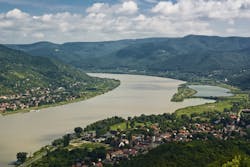LUXEMBOURG — Jan. 25, 2016 — The countries along the Danube need to do more to improve water quality in the river, a new report claims.
The report from the European Court of Auditors found that there has been little improvement in water quality in the Danube since 2004, despite countries in the river basin implementing the European Union’s Water Framework Directive. The auditors cited “lack of ambition” in the countries’ management plans as the main reason for the limited progress.
“E.U. water policy should ensure a sufficient quantity of good-quality water for people’s needs and for the environment,” said George Pufan, a member of the European Court of Auditors, in a press release. “For that to happen along the Danube, countries need to step up their efforts.”
The audit focused on four E.U. member states in the Danube river basin — the Czech Republic, Hungary, Romania and Slovakia — and highlighted the funding that had been provided to support water quality improvements.
Between 2007 and 2013, the European Regional Development Fund/Cohesion Fund provided 6.35 billion euros ($6.89 billion) to member states in the Danube basin for waste water treatment, and the European Agricultural Fund for Rural Development provided 6.39 billion euros ($6.93 billion) to compensate farmers adopting “agri-environmental” measures, noted the release.
But according to the report, the member states’ 2009 river basin management plans lacked ambition. For example, shortcomings in monitoring systems meant that there was a lack of data both on the type and sources of pollution in local water bodies, resulting in poor targeting of remedial measures. Member states also exempted, without sufficient justification, a significant number of water bodies from important deadlines for reaching good quality status, the auditors said.
The report also found that there were delays in implementing the Urban Waste Water Treatment Directive, and the Nitrates Directive (aimed at reducing nitrogen emissions) was not fully exploited, stated the release.
Additionally, treatment plants and industrial installations needing specific emission limits were not identified, and measures in the agriculture sector were “rendered less effective as they were mainly of a voluntary nature.”
The auditors recommended that the member states:
- improve their monitoring and diagnosis systems for water pollution
- provide clear and valid justifications when granting exemptions
- identify cost-effective measures to be targeted
- consider charges or taxation to discourage emissions.
You can find the entire release here.


